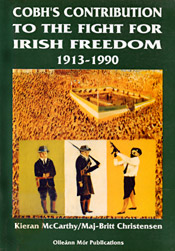
I then decided to investigate a little myself and try to increase the knowledge I already had of Cobh's republican history. After only two weeks of research I had become convinced that Cobh had indeed a proud history well worth recording. One of the most striking things I learned throughout my research was the manner in which the 26-County state dealt with and treated Republicans in every decade since its foundation and how little has really changed, except that since the advent of television and their banning Republicans from it, the state has managed to cover up its treachery and its own inability to deal with the British and in turn fail to bring about the only just and lasting peaceful solution to Ireland's 800 years agony.
Through this book I hope to show its readers how Republicans were viewed seventy odd years ago by the same sections of the establishment that condemn everything republican today, i.e. the Catholic Church, the media, the British and the native unionists, who used all the same arguments that are being put forward today in an attempt to crush people's desire to see their children live in a united and peaceful country. In every decade since partition there were people from Cobh who resisted it. These were not people who carried on a Republican tradition just for tradition's sake, but rather were people who could see that life could not, or would not, be normal and right while a large portion of the population were deprived of their right to live as a sovereign people, and that that right was being denied to them by force of arms of a foreign power.
Because of unforeseen commitments I had to leave this project in 1988 and was only in a position to return to it when I found myself incarcerated in prison in 1990. Shortly afterwards I enlisted the assistance of my friend Maj-Britt Christensen, who has since carried out Trojan work and has greatly enhanced the possibility of the book coming out on time.Finally I would like to express my gratitude to my wife Anna for her participation on the original script, and her support in getting the final draft ready for publication'.
Kieran McCarthy, May 1992.
"Cobh's Contribution to the Fight for Irish Freedom" makes a very interesting absorbent read for a number of reasons. It is not only a magnificent record of Cobh's history, its people and the way in which they redressed the question of British rule, but also deals with the Catholic Church's attitude towards the question of Irish freedom.Compared with many other Irish towns, Cobh was unique in that it was a typical example of a British community, with people divided along class-lines. In this book the authors bring out the two sides of the kind of people that made, and make up, Cobh's society. The book offers an interesting cross-community insight into what a local community looks like: it throws a light on the attitudes of the people in the community of Cobh, between those who were content to live under British rule, such as Bishop Browne and local Councillors with business interests, and those who were involved in the struggle for Irish freedom.
Fr. Des Wilson, Springhill Community House, Belfast.